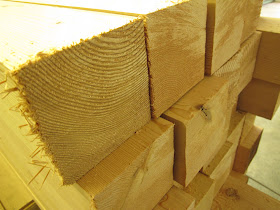Spelk. noun. Scottish and Northern English (esp. Geordie or Newcastle) dialect: 'a splinter of wood'. Also, 'a small stick or rod used as a spike in thatching'. Also, 'to bruise or split something'.
Verb. spelked, spelking: (of wood): to splinter while being cross cut; damage suffered at the end of a cut where the unsupported wood breaks away. In the US this would be termed 'blow out', or 'break out'.
Derivation. from the Old English spelc, or spilc, meaning 'a little rod by which things are kept straight', 'a splint for binding up broken bones'. Connects to Old Norse spelkur, meaning 'splints'. The word exists in Dutch today, and digging into a Dutch dictionary, one finds that spelk, spelc, and spalk all derive from the word 'to split' (i.e., cleave a piece of wood).
A variant pronunciation and spelling of spelc is spelch, typical of a dialect used in the London area, according to one source. Thus, spelched, spelching.
This picture shows a stick of cross cut fir evidencing a fair amount of spelching:
Image from Popular Woodworking's website.
Spelching can be avoided by cutting from the outside face in where possible, or clamping a sacrificial block on the exit zone of the cut, or placing the workpiece tightly against a sacrificial block at the cut end (as in a shooting board fence, or sacrificial fence on a chopsaw, or zero-clearance insert on a table saw, etc.), or trimming a bevel on the far end of the cut (when shooting the end grain with a plane).
Thanks for coming by the Carpentry Way.

If you have a square end to reference from, a shallow line cut in with a marking gauge, where the splintering away would otherwise occur, is a good way to prevent spelk.... or "damn".
ReplyDeleteGosh Dennis, what are you talking about? I've never experienced any of this 'spelk' - I thought it was merely a rumor :^)
Deletehe-he-heh!
~C
The sliding sacrificial fences on the shooting board I make prevent this from happening. When I demonstrate their usefulness, I use the word "spelching" and it usually gets a grin.
ReplyDeleteTico,
DeleteI think one should take any opportunity that comes along to throw 'spelch' into a conversation. It's a colorful word with a, shall we say, splintered history.
Thanks for sharing your anecdote.
~C
I wonder if there have been any multi million dollar studies done to see if kiln dried wood is more prevalent to 'spelch', compared to air dried? If not, someone should apply for a grant, but I'm not exactly sure where? Did Sam Maloof ever set up a foundation?
ReplyDeleteDennis,
Deletethere seems to be a study for almost everything, though I haven't come across one on that particular topic. Not sure millions of dollars would ever be directed in that direction, unless there is a military spin off somehow. :^)
I would imagine that air dried wood, if it had a higher moisture content, would have fibers that were a bit more pliant and less prone to spelking.
~C
Oo.. spelks knack!
ReplyDeleteTeessider x
I was surprised to learn that such a common word like spelk which do, indeed, "knack" seems to have remained confined to the North East (maybe Scotland too).
ReplyDeleteWe are Vikings!
Time for a long overdue pillage then?
Delete~C